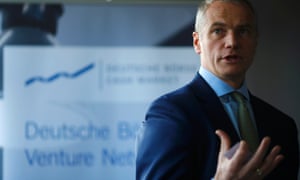LSE chief Rolet to retire after Deutsche Börse merger
Carsten Kengeter to take over as chief executive of the combined group, which will be a UK plc domiciled in London

The planned merger of the London Stock Exchange with Germany’s Deutsche Börse will result in a company with its main public listing in the UK capital.
The LSE’s chief executive, Xavier Rolet, is set to retire and his Deutsche Börse counterpart, Carsten Kengeter will take the same role at the combined company, according to further details of the proposed merged released on Friday.
It emerged on Tuesday that the LSE was in talks about an all-share merger with its German rival that would result in a group worth more than £21bn.
In Friday’s statement the LSE said the combined group would be a UK plc domiciled in London, with headquarters in the British capital and Frankfurt.
After two previous attempts at joining forces stretching back more than 15 years, the pair announced a planned “merger of equals” on Tuesday and said they were confident that regulatory and other concerns that had scuppered those deals would not prove their undoing this time.
The board will have equal numbers from each business, a move that was expected. Rolet, who has been credited with rejuvenating the company and embarking on an acquisition spree, will step down.
The combined company will seek a premium listing on the LS E and a prime standard listing on the Frankfurt Stock Exchange.
The exchanges have considered combining forces before. They agreed to merge in 2000 before a rival bid for the LSE from Sweden’s OM Gruppen scuppered the deal, which was then rejected anyway. The LSE then rejected a formal £1.3bn offer from Deutsche Börse in January 2005.

Along with Kengeter as chief executive, the chairman of the LSE, Donald Brydon, was announced as chairman of the combined company; Joachim Faber of Deutsche Börse as deputy chairman and David Warren, chief financial officer of the LSE, will hold the same position in the new company.
Rolet, a French national who has become part of the City establishment, will step down on completion of the transaction, said the statement. “Xavier has been the architect of LSEG’s considerable value creation and has offered to retire in order to ensure the successful creation of the new group,” Brydon said.
Given the British referendum on EU membership in June, the firms said a joint committee had been set up to advise on the implications of a vote to leave.
The two sought to reassure investors on Friday that their merger would prosper regardless of the outcome, even if the volume of trade in London and Frankfurt changed. “Accordingly, the outcome of the referendum would not be a condition of the potential merger,” they said.
Peter Thorne, analyst at Edison Investment Research, agreed a Brexit vote was unlikely to affect the deal as the financial infrastructure business and regulation are increasingly global. “But Brexit is a political process so financial logic may not be the only concern. The referendum committee seems a necessary precaution,” he said.
The firms also said they expected a “significant opportunity” for revenue synergies after the deal and would set out further details of what these might be in due course.
In the statement announcing the details, the boards of the companies said the proposed merger “would represent a compelling opportunity for both companies to strengthen each other in an industry-defining combination, creating a leading European-based global markets infrastructure group”. Cost savings could be made as a result of sharing technology and operations resources, the company added.
A deal would combine the LSE’s share-trading operation with the derivatives trading of Deutsche Börse’s Eurex in a group worth more than £21bn. It would propel the companies to a similar scale as US exchange ICE, which has taken a huge slice of the European derivatives markets.
[Source:- TheGuardian]
